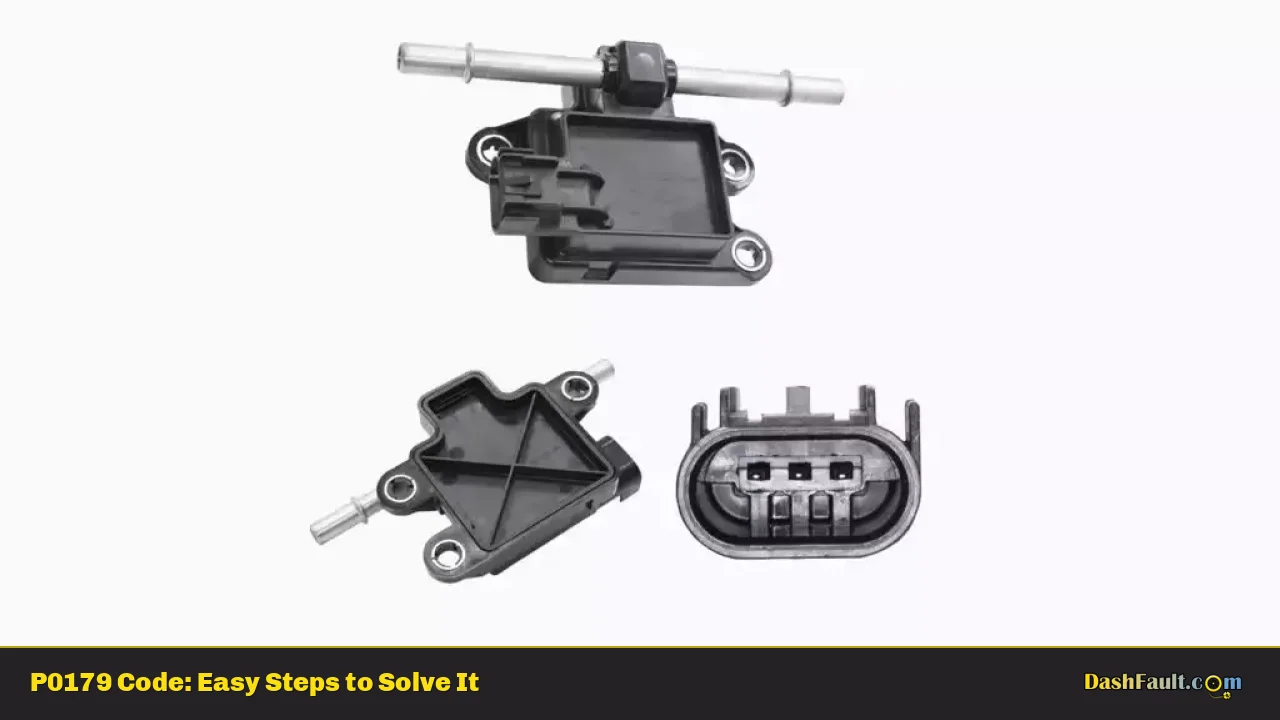The P0179 trouble code indicates a problem with the fuel composition sensor circuit, specifically a high input signal detected by the Engine Control Module (ECM). This code is crucial for vehicles equipped with flex-fuel systems, as it helps manage the fuel mixture based on the type of fuel being used. When the ECM detects a signal that exceeds the expected voltage range from the fuel composition sensor, it triggers the P0179 code. This can lead to various performance issues, including reduced fuel efficiency and engine performance problems.
| P0179 Code Meaning | P0179 Code Common Causes |
|---|---|
| Fuel Composition Sensor Circuit High Input | Faulty Fuel Composition Sensor |
| High Voltage Signal Detected | Wiring Issues (Shorts or Opens) |
| Potential Fuel Contamination | Corroded or Damaged Connectors |
| Engine Control Module (ECM) Malfunction | Damaged Fuel Lines |
| Incorrect Fuel Type Detected | Faulty Fuel Cap |
Symptoms of P0179 Code
When dealing with a P0179 code, vehicle owners may notice several symptoms that indicate an issue:
- Check Engine Light: The most immediate indication of a problem is the illumination of the check engine light on the dashboard.
- Increased Fuel Consumption: Drivers may experience a noticeable drop in fuel efficiency due to improper fuel management.
- Poor Engine Performance: This can manifest as reduced power during acceleration, engine stalling, or rough idling.
- Water in Fuel Light: In some vehicles, a specific warning light may indicate excessive water in the fuel.
Identifying these symptoms early can prevent further damage to the vehicle and help in timely repairs.
Technical Explanation of P0179
The P0179 code is related to the fuel composition sensor, which measures the ratio of ethanol to gasoline in flex-fuel vehicles. The ECM uses this information to adjust fuel delivery for optimal combustion. When there is an abnormally high voltage signal from this sensor, it suggests that either the sensor itself is malfunctioning or there are issues within the wiring and connections.
Step-by-Step Diagnosis
Diagnosing a P0179 code involves several steps:
- Scan for Codes: Use an OBD-II scanner to confirm that P0179 is present and check for any related codes (like P0178).
- Inspect Wiring and Connectors: Visually inspect all wiring and connectors associated with the fuel composition sensor for signs of damage, corrosion, or loose connections.
- Test the Sensor: With a multimeter, measure the output voltage of the fuel composition sensor while operating the vehicle. Compare these readings against manufacturer specifications.
- Check for Short Circuits: Test for continuity in the wiring harness to ensure there are no shorts or breaks.
- Examine Fuel Quality: If contamination is suspected, check for water or debris in the fuel system.
- Clear Codes and Test Drive: After any repairs, clear the codes and take the vehicle for a test drive to see if the issue reoccurs.
Solution Methods
To resolve a P0179 code effectively:
- Replace Faulty Components: If testing reveals that the fuel composition sensor is defective, replace it with a new one.
- Repair Wiring Issues: Fix any damaged wiring or connectors identified during inspection. Ensure all connections are secure and free from corrosion.
- Drain Contaminated Fuel: If water or contaminants are found in the fuel system, drain and replace it as necessary.
- Check ECM Functionality: If all else fails, consider having the ECM tested or replaced by a professional technician.
Cost Estimates
Repair costs can vary widely based on location and vehicle type but generally include:
- Fuel Composition Sensor Replacement: $100 – $300 (parts and labor)
- Wiring Repairs: $50 – $150 depending on extent of damage
- Fuel System Cleaning/Replacement: $100 – $250 if contaminated fuel is involved
It’s advisable to get multiple quotes from certified mechanics before proceeding with repairs.
Warnings and Recommendations
- Professional Help Needed: If you’re not comfortable diagnosing electrical issues or working with vehicle sensors, it’s best to consult a professional mechanic.
- Use Quality Parts: Always use OEM or high-quality aftermarket parts when replacing components to ensure compatibility and reliability.
- Regular Maintenance: Regularly check your vehicle’s fuel system and replace filters as needed to prevent future issues related to contamination.
Frequently Asked Questions About P0179
- What does P0179 mean?
P0179 indicates that there is a high input signal from the fuel composition sensor detected by the ECM. - Can I drive my car with a P0179 code?
While you can drive with this code, it may lead to poor performance and increased fuel consumption. - How serious is a P0179 code?
This code can affect engine performance and efficiency; addressing it promptly is recommended. - What causes P0179?
P0179 can be caused by a faulty fuel composition sensor, wiring issues, or contaminated fuel. - How do I fix a P0179 code?
The fix typically involves replacing faulty components, repairing wiring issues, or addressing fuel contamination. - Will clearing codes fix my car?
Clearing codes may temporarily turn off the check engine light, but underlying issues must be resolved for long-term fixes. - How much does it cost to fix P0179?
The cost can range from $100 to $300 depending on parts and labor needed for repairs. - Is it safe to ignore a P0179 code?
No, ignoring this code can lead to more significant engine problems over time.
In conclusion, understanding and addressing trouble codes like P0179 is essential for maintaining vehicle performance and safety. By following proper diagnostic procedures and solutions outlined above, vehicle owners can effectively manage this issue. Regular maintenance and attention to warning signs will help ensure your vehicle runs smoothly for years to come.
